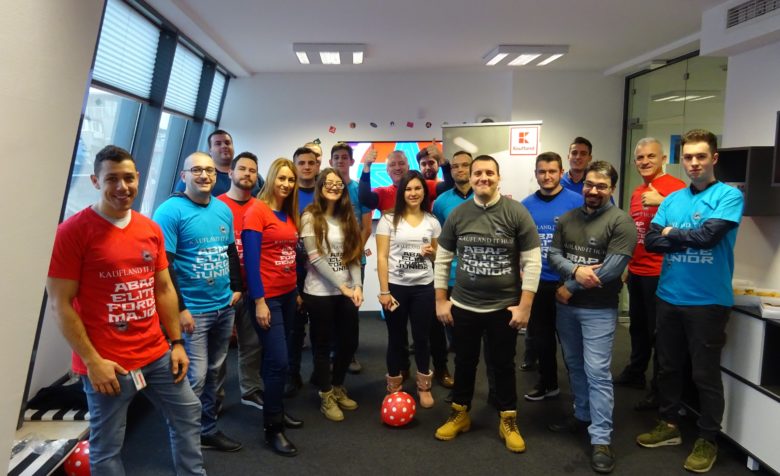Talent Development In 2020: Kaufland IT-Hub Launches Two Training Academies For Junior Developers

Retail like almost any industry nowadays is highly dependent on technology. Schwarz Group, the parent company of brands like Kaufland and LIDL and the fourth-largest retailer in the world by revenue, makes no exception. While end consumers usually don’t get to know it, behind the curtains a large set of web and mobile applications help both in-store and corporate employees do their job better and ensure the smooth day-to-day operations of the business.
One thing leading to another, the need for consistent technological know-how required the opening of the Kaufland IT-Hub in Sofia back in 2016. A little over three years later, the team has grown to over 160 people and another 90 are expected to join by the end of 2020 to work on LIDL projects as well. Aiming to address the rapidly-growing demand for high-quality engineers and building upon its mentoring culture, earlier today the IT–Hub kicked-off its internal SAP ABAP training academy and another one, focused on Java is coming in March. Both are free and aimed at young people, with next to zero professional experience in programming.
SAP ABAP: The sought-after programming language nearly nobody learns
SAP is the technological backbone of Kaufland, LIDL, and over 400k organizations worldwide. This makes ABAP engineers very valuable but at the moment it’s highly unlikely that a Bulgarian young developer would consider learning the language at all. The reason: designed for business customers, the cost of a license for most SAP products is in many cases prohibitive not only for individuals but also for universities and academies.
“In Bulgaria, you cannot really learn ABAP unless you already work for either SAP or a SAP customer. Given our increasing demand for the technology, we decided it’s time we invest in making ABAP accessible to more young people interested in programming. We want to show participants in the academy that ABAP is an interesting language with lots of use cases and goes with excellent career opportunities,” explains the motivation for the academy Desislava Ivanovich, SAP Development Manager at Kaufland IT-Hub.
Learning in the real-world
Over the course of the next six months, 16 trainees will get to master the fundamentals of ABAP development through training sessions every Monday and Wednesday, mentoring from experienced ABAP engineers, and practical projects straight into Kaufland’s SAP environment. The ones who complete the program will have the opportunity to join the team at the IT-Hub full-time as Junior ABAP developers.
“I think ABAP is a great language because together with programming, you also learn how business processes work. Everything behind SAP is related to ABAP. You get to know how logistics works, how finance works, how HR works – you get to understand why you do whatever you are doing,” says Boyan Salutski, one of the mentors in the academy and Senior SAP developer at Kaufland IT-Hub.
See if you like the technology, see if you like the company
Ivanovich says that a similar in-depth training provided by SAP costs close to €14k but it looks like that’s not the main selling point. “Trainees will have six months to see whether they like programming in ABAP or would rather switch to something else like Java, which is not that different as a language syntax. Early on in your career, with next to zero experience you never know. In addition, trainees will experience the office atmosphere and start building relationships with the rest of the team. So, if they decide to join us at the end of the program, it would be easier for them to adapt to the new job,” asserts Ivanovich.
Bridging the gap between education and the job market
A Java Bootcamp is also on the way and expected to begin in March this year. The format is pretty much the same but the incentive for its birth is slightly different. “Java is a lot more accessible than ABAP but it’s still difficult for a beginner to make the transition from graduating from university or an IT academy to being ready for the job market. In our experience, the programs provided by IT training institutions are really great for introducing people to the main concepts but not enough to prepare students for a junior-level position. We want to build upon what academies offer and get entry-level programmers closer to the needs of the business,” clarifies Teodor Dimitrov, a mentor in the Java academy and Java Department Lead at Kaufland IT-Hub.
The main learning goal? Developing the skills and mindset needed for building scalable applications that don’t break. Trainees in the Java bootcamp will cover the entire product development lifecycle and acquire knowledge on back-end and front-end programming, system infrastructure, DevOps, live app monitoring, and several other tracks.
But what applications can you actually develop at the IT-Hub in Sofia?
Well, the IT-Hub backs the technological needs of the entire Schwarz Group – from the support of existing products to the development of completely new ones. The Bulgarian center, home to the second-largest tech team of the retail group globally, consists of four main divisions – SAP development, Infrastructure administration, Application support, and Business Intelligence. The end-user is usually a Kaufland or LIDL employee but this person can be virtually anyone in the organization.
As of the time of this writing, some engineers at the hub are working on a new dynamic pricing software for in-store promotions, while others develop a mobile app for better internal communication. An example of a recently completed project is a real estate planning app for Kaufland’s first store in Australia, scheduled to open in 2021. There are apps for logistics, finance, HR, etc. Technology plays an important role in every aspect of Schwarz Group’s operations. As the impact of software is increasing for the fourth-largest retailer in the world, maybe the German-based organization will also soon see an increased added value from young tech talent in Bulgaria.
Want to learn more about the open positions in the IT-Hub? Check here.


























